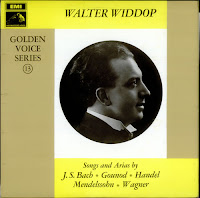What one might term the politics of economics controls what we can listen to, what we can appreciate. Many record companies, or rather media companies which produce recordings, rely on the cycle of issue, deletion and re-issue for recordings as if a digital recording was the same as a vinyl disc.
In the 1980s you could go to Cramer's Music Shop in Bond Street and order custom prints of out of print music. Such economic models are still used by music publishers in the era of the PDF. And if you go to the Opera Rara website you can acquire digital downloads of many of the company's recordings which have sold out the CDs. Production of a run of CDs requires some sort of cost balance, the expectation that a reasonable number might be sold. Opera Rara has obviously decided that Donizetti's Dom Sebastian (written for Paris in 1838) is unlikely to sell out another run of 5,000 but you can still access their excellent recording via a download.
Why is this not standard?
We are overwhelmed with music, there is a ridiculous amount available. yet when I want to acquire a particular Mozart opera recording made by Sir Charles Mackerras I have to look to re-sellers providing second hand or sold-on remainders. No digital download here. Surely there are enough classical music nerds in the world to make some sort of digital juke-box viable.
Fancy being able to buy a download of every single recording of an opera. For many years I wanted a copy of Meyerbeer's Les Huguenots with a largely Francophone cast led by Ghyslaine Raphanel, Françoise Pollet, Danielle Borst, Richard Leech, Gilles Cachemaille, conducted by Cyril Diederich. It was tantalisingly out of reach until the cycle of issue, delete, re-issue reached the re-issue stage and I can now listen to it.
In the age of vinyl discs, this role was played by the specialist record shops (such as the late lamented Harold Moores Records in Great Marlborough Street) and second-hand classical shops, providing a valuable source of obscure and hard to get recordings. Nowadays Amazon provides a similar service, want something obscure then if someone has one it is there, at a cost!
Our digital jukebox still seems miles away.
In the 1980s I had a (vinyl) disc of arias recorded by the great Yorkshire tenor Walter Widdop including some live recordings. Most have made their way onto CD but one remains elusive. Perhaps I shall have to go looking for a second-hand copy of the long lost vinyl.
One of the problems is the economic model. The way music is consumed digitally, the royalty payments are zero or minimal at best. Living artists have a perpetual struggle to get paid for recordings consumed via some digital media. In the free-for-all which arose when the digital platforms developed, the expectation that such music should be free or cheap was inescapable.
So if we do have our digital jukebox,
will anyone be willing to pay an economic amount for it?
And as a civilisation, we are still fond of things. The idea that buying a recording involves an object, rather than a mysterious digital item. That, I have to confess is an attitude I have difficulty getting rid of. If there was a digital jukebox, I would still be hankering after CDs!














No comments:
Post a Comment